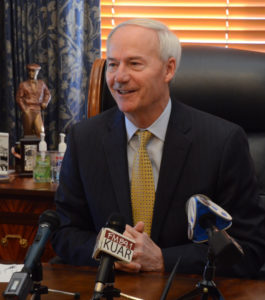 As the campaigns heat up before the May 22 primary …
As the campaigns heat up before the May 22 primary …
I’d been wondering why Gov. Asa Hutchinson hadn’t been spending more of that $1.86 million he had in the bank as of March 31. A recent poll may provide the answer.
The governor has always been an overwhelming favorite to be re-elected, but if he were to face a challenge, it more likely would happen in the May Republican primary rather than the November general election. Primaries are weird because they attract a smaller turnout with more partisan voters. His opponent, Jan Morgan, is pretty good at bringing attention to herself through hot-button issues that are important in a Republican primary – guns, in particular. In the age of Donald Trump, she’s the more Trump-like candidate.
So I thought she might make the governor sweat a little.
But according to a new Talk Business-Hendrix College poll, Hutchinson has the support of 57.5 percent of likely Republican voters, while Morgan has the support of 30.5 percent. Another 12 percent said they didn’t know.
You can bet Hutchinson has run his own polls and wasn’t surprised by those numbers. And with that war chest, he can flood the airwaves and the internet in the last month of the campaign. He can define himself – and, if necessary, her – while she doesn’t have the money to respond. He can shore up his 58 percent, grab part of that 12 percent that didn’t know, and encourage some of her 30.5 percent to vote for him or stay home.
Moreover, with 71 percent support in the 65-and-over group, Hutchinson is scoring even higher among those most likely to vote. He also has two-thirds support among Republicans who say they attend church at least weekly, which was 69 percent of the poll’s respondents.
In other words, it looks like the governor is safe for now.
Meanwhile, in the 2nd District
As a result, the most interesting race is the Democratic primary for the 2nd District congressional seat. That one pits the “establishment” and more centrist candidate, state Rep. Clarke Tucker, D-Little Rock, against three outspoken progressives: Paul Spencer, Gwen Combs and Jonathan Dunkley. The incumbent is Republican U.S. Rep. French Hill.
Tucker entered the race in February and by the end of March had raised more than $500,000. His candidacy is attracting national attention from Democrats, which is how he’s collected all that money. The influential Cook Political Report has moved the race from “Likely R” to the more competitive “Lean R.” That will enable Tucker to raise even more money – and Hill too, who can point to a growing threat. He already has banked $1.5 million.
But being the anointed candidate can be a curse as much as a blessing – particularly among Democrats this year. Two years ago, their anointed candidate got herself beat by Donald Trump. So you won’t see Tucker trumpeting his establishment credentials.
Meanwhile, Spencer had raised $250,000 after already making a name for himself crusading for campaign finance reform and political ethics. Combs and Dunkley have run energetic campaigns.
With four active candidates in the race, we’re likely headed for a runoff between Tucker and Spencer.
Remember that comment about primaries being weird because of who votes and how few of them there are? Primary runoffs have even lower turnout. It’s Tucker’s race to lose, but it’s no sure thing.
The Supreme Court race
The only statewide race that will be on everyone’s ballot this May – whether you vote in the Republican or Democratic primaries – will be the one for Arkansas Supreme Court justice. Justice Courtney Goodson is being challenged by Judge Kenneth Hixson and attorney David Sterling.
Justices do not run under a party label, and they’re not supposed to say how they would vote on a particular issue. That means voters often don’t have much information. Hixson, who entered the race last in late February, had raised the most by the end of March – but only $21,418, hardly enough to mount an ad campaign. Many voters will probably place a lot of weight on the titles that will appear beside their names, putting Sterling, who doesn’t have one, at a disadvantage.
And remember, there are three candidates, which means a runoff is likely. If so, it would happen during the November general elections.
General elections are less weird than primaries and runoffs because more people vote, representing a larger cross section of the electorate.
But they can be weird, too, especially lately.
By Steve Brawner, © 2018 by Steve Brawner Communications, Inc.